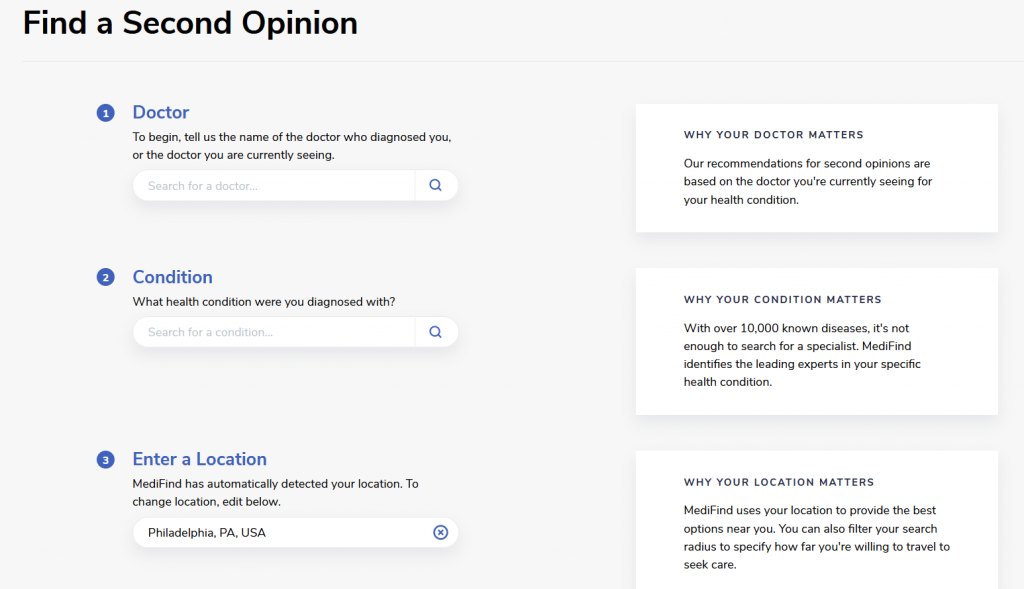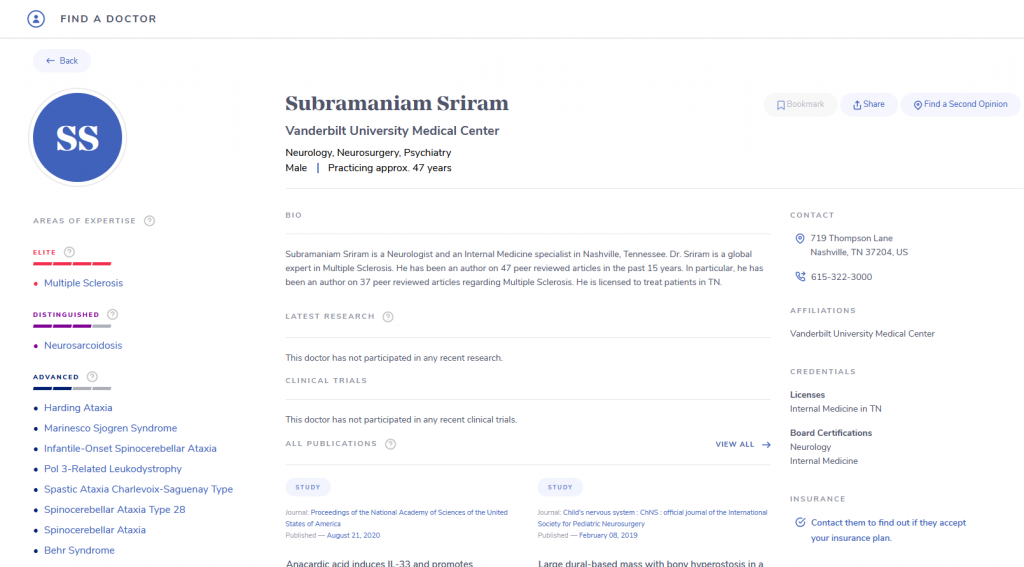Multiple sclerosis (MS) affects around 2.5 million people worldwide. Yet, the condition is still challenging for doctors to diagnose and treat. Many patients do not get a definitive diagnosis for years, while others may get misdiagnosed with multiple conditions that closely resemble the disease. For these reasons, many MS patients feel at ease getting second opinions and educating themselves on their options.
To help you navigate this journey and get answers to your questions, we dig into the research and provide guidance for getting a second opinion. We will cover how to find a second doctor who is an expert in Multiple Sclerosis so you can have peace of mind as you seek out additional perspectives on your treatment and care.
Why You Should Get a Second Opinion on Your MS Diagnosis
Getting a second opinion on your multiple sclerosis diagnosis can give you peace of mind and provide you with more knowledge and options to help you make informed health decisions. This section will discuss why the health community recommends getting a second opinion and the challenges associated with MS diagnosis and treatment.
Challenges Associated With Diagnosing Multiple Sclerosis
Multiple sclerosis is challenging to diagnose because no test currently exists that definitively establishes the presence of the disease. According to the National Organization for Rare Disorders, “Ultimately, MS is a clinical diagnosis because, while there are many laboratory tests, there is no one definitive test that firmly establishes the certainty of the disease; therefore, it is important that this diagnosis be made by an MS specialist.”
The Diagnostic Process and Misdiagnoses
The challenging process of diagnosing multiple sclerosis has undergone some refinement in recent years, but it is still not 100% definitive.
The journal Frontiers in Neurology states, “Despite significant refinement in multiple sclerosis (MS) diagnosis in recent decades, no specific disease biomarker exists, as a result of which, confirming the diagnosis is not always a straightforward process.”

During the diagnostic process, doctors often rule out other conditions with blood tests before diagnosing MS since the symptoms closely resemble other diseases. According to the National Multiple Sclerosis Society, in addition to taking a detailed medical history, doctors may also perform an MRI (magnetic resonance imaging), spinal fluid analysis, and a neurologic exam.
MRI scans may be misleading, however, if scarring is present. According to the University of Vermont Larner College of Medicine, with input from Andrew Solomon, M.D., UVM Assistant Professor of Neurological Sciences and Division Chief of Multiple Sclerosis, “A proper clinical diagnosis relies on a rigorous evaluation that includes careful interpretation of radiological data from an MRI (magnetic resonance imaging). However, MRI can complicate misdiagnosis. Scarring can show up on a scan for reasons other than MS. If patients exhibit other neurologic symptoms, a physician who does not do a thorough assessment can provide a faulty diagnosis. An overreliance on MRI abnormalities ‘without thoughtful consideration of history, symptoms, and neurological exam’ may contribute to misdiagnosis.”
Common Misdiagnoses
One of the reasons for widespread misdiagnosis is that doctors may mistake MS for a lot of other conditions such as:
- Fibromyalgia
- Migraines
- Neuromyelitis optica spectrum disorders
- Lupus
- Lyme disease
- Sjogren’s Syndrome
- Other infectious, inflammatory, or metabolic conditions.
Conversely, MS patients may also get misdiagnosed with Lyme disease, which requires an entirely different treatment protocol. Since MS can worsen over time, getting on the right treatment protocol quickly is essential.
As reported in the journal Neurology, a study conducted by four academic MS centers found that out of 110 misdiagnosed patients, more than 50% were classified as “definite” misdiagnoses while the other 46% were classified as “probable.”

Alternate diagnoses included migraine alone or in combination with other diagnoses 24 (22%), fibromyalgia 16 (15%), nonspecific or nonlocalizing neurologic symptoms with abnormal MRI 13 (12%), conversion or psychogenic disorders 12 (11%), and neuromyelitis optica spectrum disorder 7 (6%).

Getting a Second Opinion for Your MS Diagnosis May Provide a Different Perspective
As reported by a Healthline article, a neurologist at Providence Saint John’s Health Center in Santa Monica, California, Dr. Clifford Segil, says, “There are multiple medications now available that are approved to treat multiple sclerosis. These include pills, injectables, and intravenous medications. I have my preferences, and other neurologists will have their preferences in medication choice.”
The National Multiple Sclerosis Society lists 22 approved medications for managing Multiple Sclerosis, with new treatments being studied regularly. Each treatment will have varying side effects and demands, so seeing a second doctor may help you discover treatments that work for your lifestyle and preferences.
In addition to confirming your original diagnosis, getting a second opinion may also provide you with a different perspective. Even if the second doctor confirms your original diagnosis, a second doctor can also provide additional insights into care options. Other doctors may offer alternative treatment options, suggest clinical trials or prescribe different drugs that better fit your lifestyle and medical preferences.
Medication Risks and Costs
Some multiple sclerosis drugs may cause serious side effects, especially when taken for long periods. MS drugs can also be expensive, even if patients have health insurance. According to the American Journal of Managed Care, out-of-pocket costs for three sample MS agents are $5979 to $6449 per year. For these reasons, it might be a good idea to get a second opinion to confirm your original MS diagnosis.
Comprehensive Care
Getting a second opinion might also be necessary if you are looking for a comprehensive treatment approach and want to work with a team of healthcare professionals. Multiple sclerosis management and care is multi-faceted and may include managing and slowing the disease and its symptoms, treating relapses, and providing emotional support. Comprehensive medical care led by your neurologist offers you well-rounded care.
Multiple Sclerosis Expertise
Lastly, ensure your second doctor is an expert in the pathology and treatment of multiple sclerosis so that you can receive the highest quality of care. Multiple sclerosis is a complex condition. Gathering various opinions and options from reputable medical experts will empower you to make better health decisions that lead to positive health outcomes.
How to Find a Second Doctor for Your MS Diagnosis
Getting a reliable second opinion entails finding a specialist who is an expert in treating MS and managing its symptoms. But, not every neurologist has the same level of experience treating this complex condition.
Physicians will attain board certification in a specific discipline (i.e., neurology). But they may also extend their learning and dedicate their careers to studying and researching one or a few conditions. Doctors with this condition-specific expertise are considered the foremost experts in the conditions they research. Finding a doctor with this level of experience in Multiple Sclerosis is likely to increase your success rates.
When searching for an MS expert with this level of experience, look for a doctor who has well-rounded experience in your condition, which is often indicated by:
- Authoring MS-focused articles and speaking at related medical conferences
- Receiving a large number of MS patient referrals
- Treating a large number of patients with MS and participating in MS clinical trials
- Being closely connected with other MS experts

Finding these world-class doctors is not easy for most health consumers because they don’t have easy access to this kind of medical data. If they do, it can be complex to organize, disseminate, and understand.
MediFind solves this problem by combining these factors to evaluate the expertise of over 2.5 million physicians. MediFind’s cutting-edge platform compiles medical data in an easy-to-understand format to help MS patients find the best doctors quickly and easily.
Second Opinion Finder
With MediFind’s Second Opinion Finder, you can find MS specialists near your desired geographic location. MediFind helps you have the best chance of getting a quality second opinion on your MS diagnosis.
To use the Second Opinion Finder, input your condition, your original doctor, and your location. Note that widening the radius of your location search may increase your chances of finding top-tier MS doctors.

The Second Opinion Finder will then provide a list of MS doctors and evaluate them according to our expertise criteria.

For a closer look at the guiding principles that MediFind uses to determine expertise in a specific health condition, check out how MediFind works.
When you click on a profile, you will also see the doctor’s experience, authored publications, and related studies.

MediFind also collects data on the latest research and clinical trials for your condition, so you have the most recent medical advancements at your fingertips.
On the header of each page are links to help you find research information on your condition.

Multiple Sclerosis is not as straightforward for doctors to diagnose and treat as some other conditions. With MediFind, you can have more assurance that you have researched all relevant options and obtained multiple perspectives before moving forward with MS treatment.



